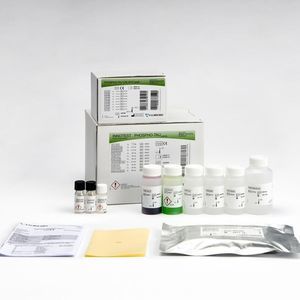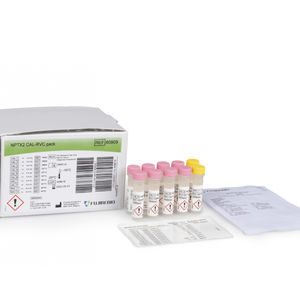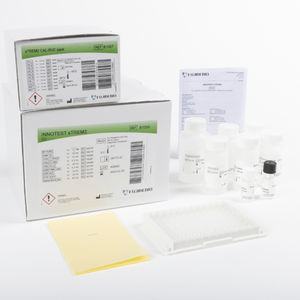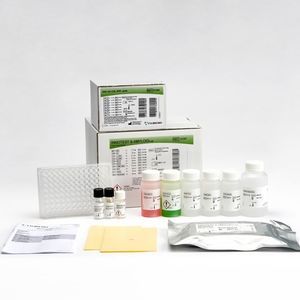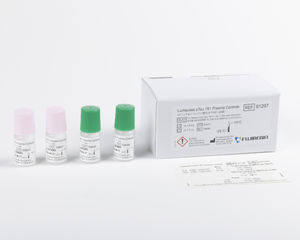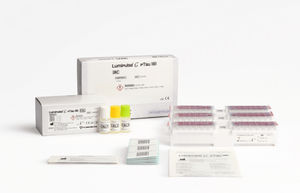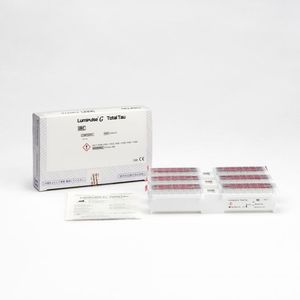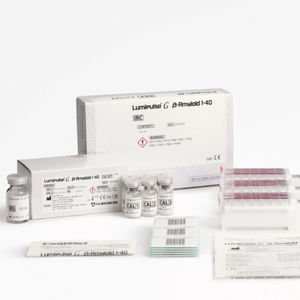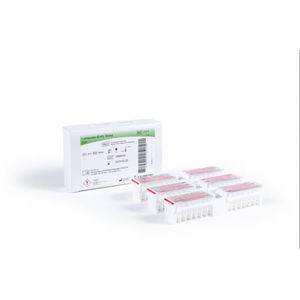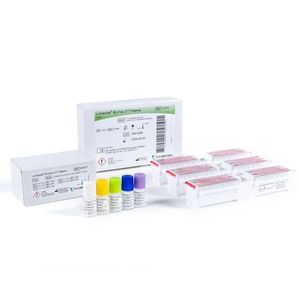
- Company
- Products
- Catalogs
- News & Trends
- Exhibitions
Neurodegenerative disease assay kit INNOTEST® PHOSPHO-TAU (181P)clinicalbiologicalcerebrospinal fluid
Add to favorites
Compare this product
fo_shop_gate_exact_title
Characteristics
- Applications
- for neurodegenerative diseases
- Sample type
- clinical, biological, cerebrospinal fluid
- Analysis mode
- enzyme immunoassay, automated, colorimetric
- Sample volume
0.3 ml
(0.01014 US fl oz)
Description
The INNOTEST PHOSPHO-TAU(181P) is a solid-phase enzyme immunoassay for the quantitative determination of phosphorylated Tau (Phospho-Tau(181P)) in human cerebrospinal fluid (CSF).
The combined use of CSF-Tau and CSF-β-amyloid(1-42) marker concentrations allows differentiation between Alzheimer’s disease (AD) and normal aging or other neurological diseases such as depression.1-5
The discrimination of AD from non-AD types of dementia such as dementia with Lewy Bodies may be further improved using the quantification of CSF-phospho-Tau(181)
Details
Advantages of our assays
Simple colorimetric immunoassays that are easily automated on microplate-processor
Supported by many peer-reviewed scientific publications
Less than 300 μL of CSF necessary for determination of complete biomarker profile
Assay range consistent with biological range of values
Clinical background
Alzheimer’s disease (AD) is the most common form of dementia and is histologically characterized by the accumulation of extracellular amyloid plaques and intracellular neurofibrillary tangles throughout the brain. The major constituents of amyloid plaques are the β-amyloid peptides consisting of 40 and 42 amino acids, which are derived from the amyloid precursor protein. Neurofibrillary tangles are made up of paired helical filaments consisting of hyperphosphorylated tau protein (phospho-tau). Tau protein, present in the brain in 6 different isoforms, is an intracellular protein that is released upon neuronal death.
A license regarding amyloid beta antibodies contained in this product under patents US 570349 and EP 0683234 has been obtained from Takeda Pharmaceutical Company Limited. Furthermore,
Related Searches
- FUJIREBIO test kit
- FUJIREBIO solution reagent
- FUJIREBIO blood test kit
- FUJIREBIO serum test kit
- FUJIREBIO immunoassay test kit
- FUJIREBIO plasma test kit
- FUJIREBIO research reagent
- FUJIREBIO infectious disease test kit
- FUJIREBIO diagnostic reagent
- FUJIREBIO laboratory reagent
- FUJIREBIO protein reagent
- FUJIREBIO molecular biology test kit
- Enzyme reagent kit
- FUJIREBIO respiratory disease test kit
- Whole blood detection kit
- Histology reagent kit
- Optical assay kit
- FUJIREBIO clinical test kit
- Cassette assay kit
- Immunology reagent
*Prices are pre-tax. They exclude delivery charges and customs duties and do not include additional charges for installation or activation options. Prices are indicative only and may vary by country, with changes to the cost of raw materials and exchange rates.



